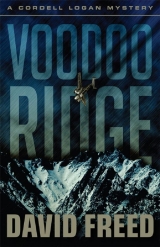
Текст книги "Voodoo Ridge"
Автор книги: David Freed
Жанр:
Триллеры
сообщить о нарушении
Текущая страница: 4 (всего у книги 17 страниц)
Wood squatted for a closer look.
“For a flight instructor,” he said, “you sure seem to know a lot about tire tracks.”
We learned all about tire tracks at Alpha, along with hundreds of other seemingly trivial topics of study. When you stalk terrorists across the globe in the name of national security, any knowledge, our instructors constantly reminded us, can become an all-powerful weapon, however inconsequential that knowledge might seem in the classroom. Tom Wood didn’t need to know all that, though.
“Tires are groovy,” I said.
He strained to laugh.
* * *
Where the pine forest was thick and the sun could not penetrate the tops of the trees, the trail was hard packed and easily negotiated. Where the trees thinned, enough so that light could filter through, the path devolved into mud. You didn’t need to be Tonto to spot two distinctly different sets of man-size footprints embedded in the brown muck. One set of prints was left by heavy-soled boots; the other, what looked like basketball or running shoes. And there was something else: to the right of the boot prints, plowed the length of the trail, were two shallow, thin gouges in the mud, spaced about a foot apart, like someone had dragged something down the mountain.
“Hikers,” Bree Kelly said as she followed me up the trail. The same two hikers, she speculated, whose tire tracks I’d noted at the trailhead, now more than an hour’s climb behind us.
“Can’t be the same hikers,” I said. “There’s only one set of prints coming back down the hill – the guy wearing the boots.”
“Could be the other guy found another way back down,” Wojewodski said, bringing up the rear. “These mountains have unmarked game trails going off all over the place.”
We stopped five minutes later for breakfast. Wojewodski offered me an apple from his pack. Wood gave me water from his CamelBak. Kelly shared a bag of trail mix. I pretended to eat the raisins, chucking them into the trees when nobody was looking. Why anyone eats dried, shriveled grapes unless they’re starving is beyond me.
The trail ascended into a narrow canyon where the sun could not go and the temperature dropped at least ten degrees, then curved northeast along a barren moraine. We traversed across talus, avoiding a modest-sized snowfield, before picking up the path on the other side and climbing in elevation. I didn’t complain when Wood stopped to check our bearings on a sun-splashed promontory overlooking Chalmers Peak and the barren granite ridge that ran south-to-north, bridging Chalmers to Mount San Marcos. I needed the rest. My legs and lungs were burning.
Wood studied the terrain ahead with a pair of scratched and dented field glasses.
“You say you saw the wreckage inside the tree line?”
I pointed. “Three hundred meters below that saddle, almost square in the center.”
We were no more than a mile from the site, Wood said. The least exhausting way to get there, he concluded, was to find a chute leading to the top of the saddle, cross the saddle to its midpoint, then make our way down the rock face and back into the pines.
“Piece of cake,” Wojewodski said, tightening the waist belt on his pack.
It was no piece of cake.
That one mile translated to a grueling, sweat-soaking, seventy-minute endurance test which probably would’ve taken considerably less time had I not lost my footing and slid about thirty feet down a sheer rock slope, twisting my football-damaged right knee and scraping up my left elbow. Wood and his colleagues had to rope me back up.
“Anything damaged?” Bree Kelly asked, checking me over.
“Only my pride.”
I stuffed the pain in a compartment deep in my brain and continued on.
“Anybody who thinks global warming is a hoax needs to come up here and have a look,” Wood said as we trudged single file behind him. “Fifty years ago, this whole area was covered with glaciers. They’re all melting, going away. Could be that’s why you saw whatever it was you saw.”
“Assuming you didn’t imagine it,” Bree Walker said.
* * *
Wojewodski spotted the debris first. The four of us had spread out line abreast, twenty meters apart, advancing slowly through the trees, when he yelled out, “Hey, I think I got something!”
I could see instantly what he’d found: remnants of a nacelle, the protective, cigar-shaped structure that protects an airplane engine. The shredded, unpainted aluminum, and what was left of the big radial engine it once housed, were wedged against a large pine and partially buried as though driven into the ground by some great force. Gouged in the earth behind the wreckage was a shallow trench twenty meters or so in length and no more than about a foot deep. This was where the nacelle had first struck the ground and been dragged along like the keel board from a sailboat before slamming to a stop against the tree. The thick blanket of pine needles that had fallen onto the trench and the nacelle, all but obscuring both from above, told me that they’d been there a long time, perhaps decades. The depth of the trench told me that the airplane to which the nacelle had once been attached had probably impacted the earth at a relatively shallow angle, as though the pilot had been flying more or less straight and level when he crashed.
Scattered to my left and similarly buried under years of pine needles, I could easily make out twisted pieces of airplane skin and frame: wing spars and ribs and what appeared to have once been an elegantly rounded wingtip.
“Hey, you guys! Hey, over here!”
I turned and saw Wood in a narrow draw, down slope, far to my right. He was waving frantically, motioning for us to come quickly. I ran as fast as my banged-up knee would allow.
There, in the shadow of the ridgeline that towered above us, partially covered over by snow and broken pine branches, was the mostly intact fuselage of a venerable, twin-engine Beechcraft, a Model 18. The empennage, or tail assembly, looked to have been sheared off.
As I approached it from the rear, I could see that the plane had come to rest on its belly, listing slightly to the left, the ground around it strewn with jagged pieces of aluminum and other debris shed upon impact. The fuselage door, aft of where the wings had ripped away when the plane went into the trees, was canted open, dangling by a single hinge. Inside the door was an open wooden crate, approximately three feet by three feet. On the ground directly outside the door was what looked to be one side of the crate. The tail number – NC1569—was evidence that the plane was more than 60 years old. Federal aviation authorities stopped adding the letter “C” to aircraft “N” registrations soon after World War II.
Through the shattered cockpit windows I gazed down at the mummified remains of the pilot, whose body was only partially decomposed thanks to the glacial conditions where his aircraft had come to rest. He was slumped forward, still strapped into the left seat. The right front quadrant of his chalky skull was missing, along with most of his front teeth – injuries that I assumed he had incurred when his face smacked the instrument panel upon impact. He’d been wearing a woolen watch cap and a double-breasted navy peacoat when he died. Both were now moth-chewed and hanging from his body in tatters. He’d also been armed. The butt of what looked like a .45-caliber, semiautomatic Colt Model 1911A protruded from the right pocket of his coat.
None of that, however, gave me as much pause as what I saw next, and left me wondering what the hell I’d gotten myself into.
Lying beside the wreckage, just forward of the airplane’s crumpled nose, was the dead body of a young man. His arms and legs were outstretched, like he’d been making a snow angel.
Lifeless green eyes stared up at a cloudless sky. Around the torso was snow dyed black with blood. Goose feathers poked out from three dime-size bullet holes in the front of his down-filled, shiny black parka.
“Anybody recognize him?” Wood asked.
“His name’s Chad,” I said, staring down at the young man’s face. “He worked at the Tahoe airport.”
FIVE
The terrain wasn’t flat or clear enough for the El Dorado County sheriff’s Jetranger to put down, so the helicopter pilots landed in a meadow about a quarter mile to the west. The homicide investigator assigned to the case hiked in the rest of the way.
Wood showed him where he’d found fresh prints of climbing boots that tracked across a crusty patch of snow, away from the crash site, then accompanied him to Chad’s body.
The investigator walked slowly around the corpse, pausing periodically and squatting on his haunches to assess it from different angles, like he was lining up a putt. He was in his mid-thirties, on the stocky side, with sandy, close-cropped hair and a requisite cop moustache that hadn’t quite grown in yet. He wore jump boots, green uniform pants bloused at the calves, a tan uniform shirt, and a green tactical vest under a green sheriff’s parka. A badge was stitched in gold on the chest, just below his name tag: Streeter.
He snapped on a latex glove and tugged gently on the kid’s left hand, which was bent awkwardly inward at the wrist, palm up, fingers outstretched. There was little give in the fingers indicating Chad had probably been dead at least twelve hours – the time it takes humans to reach maximum stiffness after death, depending on their individual physiology and ambient air temperatures. Yet one more thing you learn hunting terrorists.
“Anybody touch anything?” the investigator wanted to know. “Move anything? The body? Inside the plane? Anything?”
All three search and rescuers adamantly shook their heads no.
“Good. Let’s keep it that way. We’ve got patrol units scouring the area for suspects. I’ll get the forensics team up here A-SAP.” Streeter stood, rubbing his chin with the heel of his hand, and peered in through the broken cockpit window at what was left of the pilot. “Whoa. I’d say this dude’s definitely been up here awhile.”
“Since October, 1956,” I said. “I’m guessing the plane was somewhere out of the LA area.”
Streeter turned and gave me a “Who the hell are you?” look.
“This is Mr. Logan,” Wood said. “He was the pilot who spotted the wreck yesterday.”
“Why 1956?” Streeter said.
“There’s a bunch of old newspapers wadded up in the rear of the plane – copies of the Los Angeles Times. All the ones I saw were from October ’56. ‘Cincinnati’s Birdie Tebbetts Named National League Manager of the Year.’ ‘Soviet Troops Invade Hungary.’ ”
Streeter wasn’t happy with me. He asked me my name again. I told him.
“You went inside the plane? You contaminated the crime scene, Mr. Logan.”
“I touched nothing, disturbed nothing. All I did was take a look. I’d suggest you do the same, Deputy. There’s something you really need to see.”
I pointed out the side of the plywood crate, lying on the ground outside the fuselage door, and the nongalvanized box nails jutting from the wood, their tips bent and shiny.
“The nails aren’t rusty,” I said.
“Which means what?”
“Which means they haven’t been outside long enough to get rusty. And the plywood’s not warped. Somebody pried open that crate and tossed out that piece within the last day.”
He looked inside the fuselage door at the crash-damaged crate, sitting open and empty, save for hundreds of balled-up pieces of newspaper scattered in and around it.
“They used the wadded-up paper to pad whatever was inside the crate,” I said. “Whatever the shooter found inside that crate was so valuable, it apparently was worth pumping three slugs into that kid over there.”
Streeter wouldn’t admit it, but I could tell by the way he rubbed the side of his face that I was talking sense.
“What kind of plane is this?” he said.
“A twin-engine Beech 18. Also known as a ‘Twin Beech’ because of the twin tail. Beechcraft started building them before World War II. Cranked ’em out for more than thirty years. Great airplane. They were the Lear jets of their day. The FAA should still have a record of it on file based on the tail number. They’ll know who owned it back in the day. They’ll also know when it was reported missing.”
Streeter exhaled and said he’d check it out. He clearly didn’t like anyone telling him how to do his job.
* * *
It was past 1630 hours by the time the sheriff’s helicopter flew me back to the South Lake Tahoe Airport, then took off again almost immediately, airlifting two crime scene analysts to the crash scene. I watched the chopper lift off, grateful at not having had to hike all the way back out. I checked on the Ruptured Duck, making sure he was securely tied down on the flight line, and patted his nose like the trusty mount that he was. Then, feeling tired and hungry, my knee throbbing, I walked into Summit Aviation Services.
Marlene was sitting behind the reception counter, sobbing.
“One of the sheriff’s helicopter pilots said it was Chad they found up there. Please tell me that’s not true.”
“I’m afraid it is, Marlene.”
“I’m sorry,” she said, drying her eyes with a Kleenex. “I don’t mean to get all emotional. You look like a man who could use a hot cup of hot coffee.”
She started to get up. I insisted that she stay put and helped myself to both.
“Such a nice young man.” Marlene shook her head and took a deep breath. Her chin quivered. “It’s just so terrible. Why’d he go up there? For what? Why would anybody want to hurt Chad? I don’t understand.”
“Nobody does at this point. Except whoever did it.”
She said she’d been trying to reach Summit’s manager, Gordon Priest, to give him the bad news, but Priest wasn’t answering his cell phone.
“I know he’ll take it hard,” Marlene said, her voice cracking. “They bickered once in a while, but Gordon was Chad’s uncle. He really loved Chad. They were like two peas in a pod, those two.”
Priest, she volunteered without me asking, had gone to a big operational meeting at the FAA’s Flight Standards District Office in Reno. He’d left a message that morning on the answering machine saying he wasn’t sure he’d be back in the office that day before close of business.
“I know he’ll be devastated,” Marlene repeated.
The Buddha advised great caution when prejudging others, “lest you run the risk of being wrong.” That kind of blind, benefit-of-the-doubt benevolence doesn’t allow much maneuver room for the kind of gut instinct I was trained to follow when I worked for the government. My gut told me in this instance that it was more than coincidence, Gordon Priest being away at some out-of-town “business meeting” the day after the fatal shooting of his nephew. But if you’re a Buddhist, you do your best to let the bad stuff go. You embrace the good in everyone, however much in short supply good may be these days.
And so I tried. Who, after all, murders his own nephew?
* * *
“You were busy, Logan. I understand that. But it would’ve been nice if you’d called to let me know you’d be up there all day.”
“I would’ve, Savannah, believe me, but there’s no cell service.”
She blew air through her lips and made a right turn off Airport Road, onto Emerald Bay, heading north toward our B&B, after picking me up. I turned on the Yukon’s radio to break the strained silence in the car. A country tune was playing. Some guy whaling on his guitar with great earnestness, “Get your tongue out of my mouth ’cause I’m kissing you good-bye.”
“Are you mad at me?”
Savannah shook her head.
“You seem mad.”
“You were doing what you had to do. I’ll get over it – but not if you don’t turn off that awful song.”
I turned off the radio.
“Thanks for picking me up.”
“Of course.”
More silence.
“We’ll get the license tomorrow,” I said, “assuming you still want to.”
Savannah glanced over and gave me a smirk.
“I’ll take that as a yes.”
She almost smiled.
I reached across the seats of our rented Yukon and caressed her silken neck.
“So, what did you find up there? Anything?”
“An airplane.”
“Really? Just like you said.”
I didn’t say anything.
“Anybody alive?”
“The plane had been up there a long time.”
I debated filling in the blanks for her. About the skeletal dead pilot. About the mysteriously empty crate. About the dead young man we’d met at the airport the day before. But what purpose, I asked myself, would any of that have served, beyond unnerving the woman I wanted to spend the rest of my life with? We’d flown up to Lake Tahoe to get remarried. Tomorrow, we would. Nothing other than that mattered much in my opinion, not even a murder.
“Were there bodies?”
I looked out the window and didn’t say anything.
“I’m just curious, Logan. You don’t have to say if you don’t want to.”
“Yeah. There were bodies.”
We rounded a curve doing fifty-five in a forty-five mph zone. A highway patrol cruiser was sitting on the shoulder of the road. Savannah braked, glancing down at the speedometer, then up anxiously in her rearview mirror as we passed by the cruiser. The cop didn’t stop us, though. Savannah said it was an omen of good things to come. I attributed it to blind luck. But that’s just me. I turned the radio back on to the same country-western station. The song that was playing, near as I could discern, was, “I’m Not Married, But the Wife Is.”
Savannah, a native Texan who was not keen on the music she was subjected to as a child, groaned. “What in heaven’s name are we listening to?” She reached down and changed stations: a smorgasbord of hip-hop, top-forty, Spanish language, then this:
“… said the wreckage was discovered below Voodoo Ridge, in a remote, mountainous area of the El Dorado National Forest, about eight miles west of South Lake Tahoe. There were no survivors. Officials said they believe the plane may have been missing for several years. Sources familiar with the investigation, meanwhile, told KKOH News that sheriff’s authorities are treating the crash site as an active crime scene. Meanwhile, in the nation’s capital today, congressional Republican leaders accused the White House of—”
I switched stations.
Savannah glanced over at me with a quizzical look on her face. “The plane’s been missing for ‘several years,’ but they’re treating it as an ‘active crime scene?’ That seems rather strange, doesn’t it?”
“Somewhat.”
She knew I was holding back.
* * *
As Savannah slowed and turned into Tranquility House’s small guest-parking area, I could see that the door of our bungalow was cracked open.
“That’s weird,” Savannah said. “I know I locked it before I went to get you.”
“You sure?”
“Yes, Logan, I’m sure.”
I told her to wait inside the car, got out, and approached the bungalow.
Among operators tasked with breaching a targeted structure, the first man through the door is known by various monikers. The Point Man. The Bullet Catcher. The Meat Shield. The guy voted Most Likely to Succumb. You never know who or what’s waiting for you on the other side. A task for the faint of heart it’s not. When you’re unarmed and there’s only one of you, as I was, the task can be especially daunting. I could’ve waited out whoever was inside, assuming anyone was, but waiting was never my style. That left two tactical options: storm in or sneak in. I opted for the latter, if only because it was the less confrontational way to go and thus, philosophically, more Buddhist-like.
I pressed my back against the wood siding of the adjacent wall. With my right arm extended, I slowly pushed open the door a few inches, careful to keep clear of the gap and the door itself, where a shooter was likely to fire if his intention was to stop me from coming in. The hinges were well-oiled. They didn’t squeak. Nobody shot at me.
Had I still been with Alpha, serving as the point man in a standard, five-man entry team stacked up outside the door, I would’ve waited for the last guy in the stack to squeeze the shoulder of the guy ahead of him, indicating he was ready for action. That “ready” signal would have been passed up the train until the guy behind me squeezed my shoulder, telling me we were all good to go. Then we would’ve gone. With my submachine gun or short-barrel shotgun raised to my shoulder and ready to fire, I would’ve moved to my left, sweeping the room and my field of fire from left to right. The man directly behind me would’ve entered, shifted to my right, and scanned from right to left. We would’ve stayed a foot away from any walls because bullets tend to ricochet within six to eight inches of walls. And we would’ve put multiple hollow-point rounds into the vital organs and skulls of anyone remotely threatening. But, like I said, it was just me, and I was without the comforts of a good gun.
I waited a few seconds, exhaled slowly, and walked in.
The bed had been made. Things tidied up. Nothing looked amiss. Nobody was there. That’s what I thought initially. Then, from inside the bathroom, I heard a male voice mutter, “Mmmm. Oh, yeah.” I moved quietly and peaked around the corner:
Preston Kavitch, the son of our B&B hosts, Johnny and Gwen, was standing at the pedestal sink, in front of the antique, gilt-framed mirror. He was stroking his crotch with his right hand and caressing his left cheek with a pair of Savannah’s black lace panties.
“Hey there, sport.”
Startled, he stumbled backward and fell into the claw-footed tub.
“I was just—”
“—Just what? Doing your best Pee Wee Herman imitation?”
“Actually, I was…” Preston cleared his throat. His eyes darted in every direction but mine. “I was changing the light bulb over the sink. It went out. Your lady told my mother it was out before she left to go wherever. I’m in charge of maintenance. It’s what I do. Only I couldn’t find a sixty watt, so I had to get a seventy-five watt, which’ll be bright, but that’s OK. Not that big a difference between sixty and seventy-five. Uses more energy, but whatever.”
His nervous eye movement and his manic elaboration of insignificant, irrelevant details, instead of sticking to the topic at hand – namely, him being a pervert – more than confirmed my suspicions that Preston Kavitch was exactly that.
“Please don’t tell my parents, OK?”
“Why wouldn’t I tell them?”
Preston had to think about that one for a second. “Because I’m really a nice guy?”
“Nice guys don’t go round sniffing their guests’ underwear, Preston.”
“I wasn’t sniffing. I was… appreciating.”
“Hand ’em over, Preston.”
He handed me the panties. Then he started crying.
“They’ll kick me out of the house if you tell ’em,” he said, crocodile tears flowing, still sitting in the tub with his legs hanging awkwardly over the edge. “I got nowhere else to go. Please, it won’t happen again. I swear it.”
There was a time when I would’ve ignored his begging and made a point to teach him a proverbial lesson he’d never forget, one that might’ve involved the spilling of blood and a broken bone or two. Back then, I didn’t feel sorry for many people, including those who got down on their knees and begged me for their lives. I steeled myself against their pleas; they got what was coming to them. But then I started getting older, and maybe, more or less, a little wiser.
“Get up, Preston.”
He gripped my outstretched hand and I hauled him out of the tub, just as Savannah came walking into the bungalow.
“Logan?”
“In here.” I stuffed her panties in the back pocket of my jeans.
“Please,” Preston whispered, “you can’t tell her.”
Savannah entered. “What’s going on?”
“Preston had to change a light bulb.”
“That’s right,” Preston said. He fished the old bulb out of the antique wire trash basket and made a point to show it to her. “Burned out. Just like you said.”
“Thanks for getting to it so quickly,” Savannah said. “It would’ve been hard to see in here tonight otherwise.”
He gave me a furtive glance, lowered his head and walked out of the bathroom. I waited until I heard the door close and latch.
“You told his mother about the light bulb?” I asked Savannah.
“Yeah. Why?”
“Nothing.”
I’d been wrong about Preston Kavitch. He hadn’t lied to me. He may have been a disgusting pervert, but he was, at least in this instance, an honest one.
“You’ve got that look on your face,” Savannah said.
“What look would that be?”
“The ‘weight of the world’ look. I’ve seen it before, Logan. Innumerable times. And I learned a long time ago that it’s pointless, me asking you, ‘What’s wrong?’ Because you’ll never tell me, anyway. Now, why don’t you slowly undress me and take me to bed?”
I was sorely tempted. I was also plain sore, not to mention exhausted. I couldn’t decide which hurt more, my scraped elbow or twisted knee. Both of my feet were blistered. My shoulders felt like they’d been stomped on by contestants from “The Biggest Loser.”
“Would you be offended,” I said, “if I took a hot bath instead, alone?”
“No, I wouldn’t be offended.” She tilted her head subtly and her eyes smiled. “I just wish I’d had the presence of mind to bring along your Mr. Bubble.”
“I’ll survive.”
She held my face in her hands and kissed me softly, one cheek, then the other.
“Go take a bath, Logan. Let me know if you need anybody to wash your back.”
I assured her I would.








